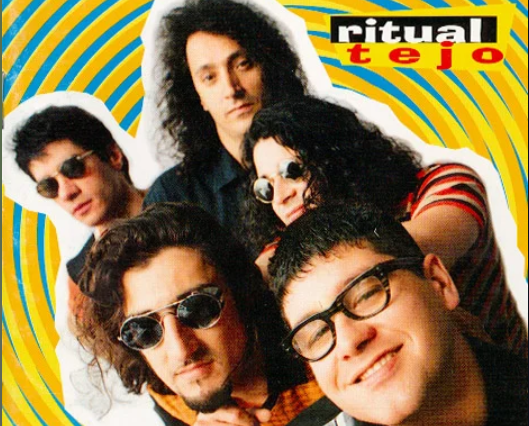The name Ritual Tejo appeared at the end of 1988, right after the still Easy Gents had won the 5th Modern Music Contest of Rock Rendezvous.
Ten months after Paulo Costa joined José Manuel Afonso and Artur Santos, it was Fernado Martins and Quinzé Rebelo’s turn to embrace the “cause”. With the formation complete, they record the theme “Ansia” included in the collection “Registos” by RR.
In 1990 they signed their first record contract with EMI-Valentim de Carvalho and started the pre-production work of what was their first long-term work. “Perto de Deus”, produced by Paulo Neves (Ban’s producer) would then be considered by some to be the best album of 1992, having been nominated for the BLITZ awards in three categories – best album, best single and best voice.
In addition to the homonymous theme, “Perto de Deus” included songs such as “Foram Cardos, Foram Prosas”, “Lenda do mar”, “Saudade”, “Sonhos de Luxúria” and “Fairyland”. During the years 1992 and 93 they would be one of the national bands with more shows on the continent and islands, managing to achieve an enviable prestige, largely due to the dynamics of the shows.
They start their first tour in September 92 in Costa da Caparica and in December they play the first part of Bryan Adams concerts in Alvalade and Exponor. Around seventy shows all over the country follow, including the opening of Psychedelic Furs at the Lisbon Coliseum. They record the version of the theme “Dar e Receive” by António Variações for the tribute album to the late author and singer – “Variações – as cangues de António”.
In 1994, they signed an agency and management contract with Regiespectacle, after a mediatic disagreement with their previous manager and agent. The following year, they began recording their second album of originals (co-produced with Fernando Júdice and Cajó), which would be released in 1996 by Farol.
“Histórias de Amor e Mar”, which lent its name to the album, was the 1st single, but it would become “Nascer another time”, commonly known as “1, 2, 3”, which would become the great success of this second album. Once again, they begin a long tour of the country and islands, with visits to Macau and Germany. Still in 94 they would be invited to the project “Filhos da Madrugada”, for which they recorded “Canto Moço”. This project had the participation of around 20 national bands and projects and gave rise to a mega show at the Alvalade stadium.
In 1998 they signed for Warner Music in Portugal, becoming the first national band in the catalog of that label. Several divergent interests dictated the departure of Fernando Martins and Quinzé Rebelo who would create the “Tambor” project. Paulo Costa, José Manuel Afonso and Artur Santos start recording the new album that would again be produced by Paulo Neves and would be released in 1999. “Três Vidas” was simultaneously a summary of a long career on the road and the beginning of a new phase.
RT would go back on the road, this time with two guest musicians – Pajó on keys and programming and Marco Cezário on drums. In 2000 and 2001 they participated in two albums with the themes “BB” (Big Brother 3), “Ouro sobre Azul” and “Quem és tu?” (Life knows well). At the end of 2001, when they were composing new themes for the fourth album, Paulo Costa suffers an appalling car accident that would cause injuries to his face and upper limbs. The multiple fractures of the nasal septum modified his voice and prevented him from singing. It was the beginning of a long and painful process of physical and psychological recovery, becoming a decisive factor in the unannounced death of Ritual Tejo.
In February 2006, at the suggestion of their former agency, the five original elements decided to get together to edit a collection and go on a tour. “OITENTAENOVE.01” is born!






website with lots of useful information
Este artigo tem algumas incorrecções na tradução, posso vos ajudar nisso se precisarem